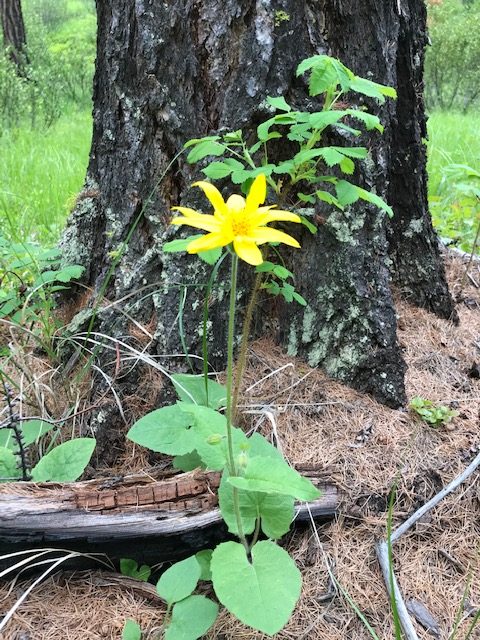I’ve returned from a walk with a close friend and, as often happens, the walk inspired me to put words on paper.
We hiked a series of trails in the forest south of the city, a light rain falling on us, my friend’s young dog crashing through the trees first to our left, then to our right.
Sometimes we talked, sometimes we walked in silence. Birds chattered around us—the tiny kinglets with their ascending triplet songs high in the trees, the banging of a pileated woodpecker on a long-dead aspen. Squirrels marked our passage with their scolding. At our feet, blooming wildflowers—lupines and arnica and wild strawberries.
“All walking is discovery. On foot we take the time to see things whole.” ~ Hal Borland
I know that most of my writing colleagues deeply appreciate this same habit, this same link between walking and writing. When I am at a trailhead, or even when I simply close my front door behind me and head toward the local community forest, I choose where to go, how long and how far, and how slow or fast I will walk. Unconsciously, my brain builds a mental map of where I’m going, settles on a way forward, then translates that into action, one step at a time. Does that sound like writing?
“All truly great thoughts are conceived by walking.” ~ Fredrich Nietzsche
“Methinks that the moment my legs begin to move, my thoughts begin to flow.” ~ Henry David Thoreau
“How vain it is to sit down to write when you have not stood up to live.” ~ Henry David Thoreau
“Thoughts come clearly while one walks.” ~ Thomas Mann
Once I’m walking, either alone or with a friend, the rhythm of my footsteps on the trail, and the repetitive, in-and-out sound of my breathing creates a form of thinking that—depending on my speed (or the steepness of the hill)—is either conducive to developing broad sweeping narratives, or to solving tricky individual plot points that may hide from me while I’m sitting at my desk. My heart pumps blood and oxygen not just to my muscles but to my brain.
“The rhythm of walking generates a kind of rhythm of thinking, and the passage through a landscape echoes or stimulates the passage through a series of thoughts. This creates an odd consonance between internal and external passage, one that suggests that the mind is also a landscape of sorts and that walking is one way to traverse it. A new thought often seems like a feature of the landscape that was there all along, as though thinking were traveling rather than making.” ~ Rebecca Solnit
Not surprisingly, there is science behind this. In a series of experiments by Stanford University researchers (which, by the way, was designed while they were out for a walk…), they found that students who walked thought of between four and six more novel uses of everyday objects than when they were seated, and 95 percent of them were able to generate unique metaphors when walking, compared to only 50 percent who never stood up. That matches with what I hear from most writer friends when they’re asked how they get past writer’s block: “I get up from my desk and go for a walk.”
“For, as I think I have said, I can only meditate when I am walking. When I stop, I cease to think; my mind only works with my legs.” ~ Jean-Jacques Rousseau
And where we walk matters as well. In a study from the University of South Carolina, students who walked through green spaces improved their performance on a memory test more than did students who walked on busy city streets.
“In every walk with nature, one receives far more than he seeks.” ~ John Muir
“Of all the paths you take in life, make sure a few of them are dirt.” ~ John Muir
For me, the most profound benefit comes at the end of a walk, when I again sit down at the desk to continue writing. My mind is fresh, my body filled with oxygen and endorphins and fresh thoughts.
“Walking organizes the world around us; writing organizes our thoughts.” ~ Ferris Jabr
In the end, I find that walking and writing are comparable endeavours. They are equal parts physical and mental, and like all parts of the forests through which I walk, they are in symbiosis—one needs and supports the other in equal measure.
I am thankful to have found, and to love, both.

 Share on bsky
Share on bsky







Read 6 comments and reply